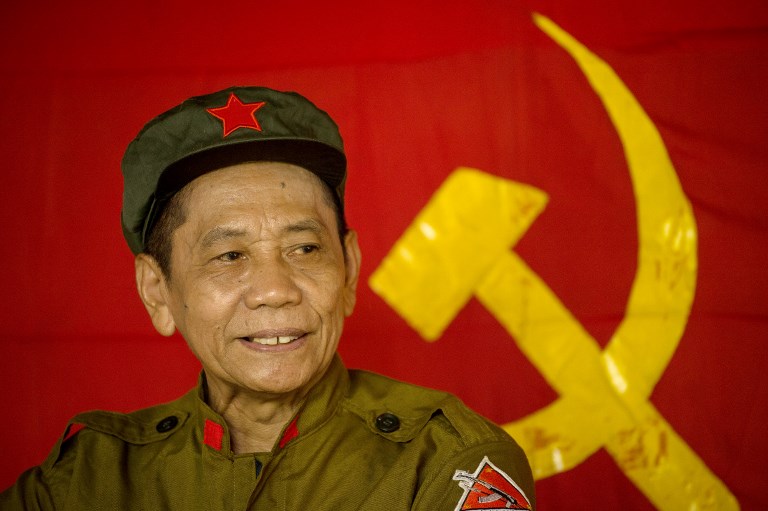
This photo taken on July 30, 2017 shows Philippine communist leader Jaime Padilla during a press conference of the New People’s Army (NPA) in the Sierra Madre mountain range, located east of Manila. AFP
Communist guerrillas said Thursday a Philippine government court petition to have them designated as terrorists is a desperate attempt to alienate them from the people, but insisted they are still open to talks to peacefully settle one of Asia’s longest-raging insurgencies.
Regional rebel commander Jaime Padilla said by telephone that President Rodrigo Duterte would fail like past leaders to defeat the New People’s Army rebels so he’s resorting to “fake news” to undermine the Maoist guerrillas, who have managed to wage an insurgency for nearly half a century with what he said was the people’s support.
The Department of Justice asked a Manila court on Wednesday to formally designate the Communist Party of the Philippines and its armed wing as terrorist groups. It cited deadly attacks and violence committed by the insurgents, including bloody internal purges of suspected military spies, in seeking the designation.
READ: Gov’t asks court to declare communist rebels terrorists
Padilla rejected the assertion that the New People’s Army was similar to extremist groups notorious for beheadings and other atrocities.
“The Abu Sayyaf is heaven and earth different from the NPA,” Padilla said, referring to the brutal Islamic militant group blacklisted by the U.S. and Philippine governments. “Labeling the revolutionary movement as such is a big crazy act.”
He said rebels attack government forces who raid or infiltrate guerrilla zones but the guerrillas do not assault innocent civilians or ransack their properties like the Abu Sayyaf.
“If they withdraw the petition that will be good because it’s baseless,” said Padilla, who leads a rebel force that has a presence southeast of Manila.
Despite the government legal offensive, Padilla said the rebels remain open to a resumption of negotiations to end the hostilities.
Duterte resumed peace talks with the guerrillas after he rose to power in 2016. He granted concessions by appointing three left-wing activists to his Cabinet, but the cordial relations rapidly deteriorated when he protested continuing rebel assaults on troops and policemen, along with guerrilla extortion of mining firms and agricultural plantations.
Last year, he canceled Norwegian-brokered talks with the guerrillas and signed an order declaring the rebel groups as terrorist organizations in a prelude to his government’s formal move on Wednesday.
Duterte has upped his rhetoric against the rebels in recent days, saying troops should shoot female communist rebels in the genitals to render them “useless” and suggesting troops could decapitate the rebels. The comments have drawn condemnation from rights groups.
Senior assistant state prosecutor Peter Ong said the guerrillas were insincere in their talks with the government and only wanted to grab power.
If approved by the court, designating the communists as terrorists could serve as a legal weapon and basis for the government in securing court clearances to put rebel leaders and fighters under surveillance and freeze their bank accounts and assets, Ong said.
Companies paying the so-called “revolutionary taxes” to the rebels could be questioned, even though the military said such extortion demands have been done by coercion.
The communist rebel organizations are the second to be targeted by the Philippine government for proscription under a seldom-used 2007 anti-terrorism law. In 2015, a court approved a similar petition against the Abu Sayyaf, which has also been blacklisted as a terror group by the United States.
The communist rebellion has raged since 1969 and left about 40,000 combatants and civilians dead. It also has stunted economic development, especially in the countryside, where the military says about 3,700 Maoist insurgents are still waging a guerrilla war.